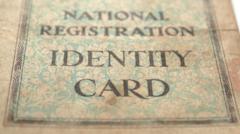Is Digital ID a Smart Move for Britain or an Orwellian Trap?

Published: 2025-09-26 12:14:16 | Category: News
The proposal for branded digital ID cards in the UK has stirred significant debate, with privacy advocates labelling it a 'cynical ploy' that may mislead voters regarding immigration control. The plan raises pressing concerns about data security and civil liberties, while opinions among the public vary widely. Some see it as a necessary modernisation, while others view it as a step towards a dystopian future.
Last updated: 17 October 2023 (BST)
Key Takeaways
- The UK government plans to introduce digital ID cards amid mixed public reactions.
- Privacy advocates warn against potential data security risks associated with the cards.
- Some citizens express strong opposition, while others support the initiative for its conveniences.
- The government assures that robust security measures will be in place to protect users' data.
- The details of implementation and potential costs remain unclear as plans are still developing.
Understanding the Digital ID Proposal
The UK government’s proposal to introduce mandatory digital ID cards has been met with both enthusiasm and scepticism. Aimed at streamlining identification processes, the cards are expected to allow users to access services such as passport applications, the NHS, and National Insurance numbers with ease. However, many question the necessity and security of such a system.
What Are Digital ID Cards?
Digital ID cards are electronic identifiers that can be stored on smartphones or other devices. They serve as proof of identity, allowing individuals to verify their identity online or in person. In the context of the UK government’s plan, these IDs would indicate whether a holder, regardless of nationality, is legally permitted to work or rent property in the UK.
Public Backlash and Support
The response from the public has been overwhelmingly mixed. Many Metro readers have taken to social media to express their disdain for the proposal, with some vowing to abandon their smartphones entirely if it comes to fruition. Comments such as those from Alison Carrington and Danny Benton, who stated they would revert to using a Nokia 3310, highlight a nostalgic resistance to modern technology being forced upon them.
Concerns Over Privacy and Security
Privacy campaigners have raised alarms about the implications of mandatory digital ID cards. Critics argue that it could lead to increased surveillance and data exploitation, labelling the initiative as 'dystopian.' Concerns about the potential for data breaches are paramount, especially regarding what happens if a user’s phone is lost or stolen. Individuals like Natasha Mickleburgh and Matthew Webster have conveyed their unease about the risks associated with storing sensitive information on a mobile device.
Government Reassurances
In response to these concerns, the government insists that the digital ID system will be built on state-of-the-art security technology. They claim that should a device be lost or stolen, digital credentials can be revoked and reissued, purportedly offering superior security compared to traditional physical documents.
Comparisons to Existing Identification Systems
Several individuals have pointed out the redundancy of introducing a digital ID when we already possess numerous forms of identification, such as passports, driving licences, and National Insurance numbers. This sentiment was echoed by Debbie Booker and Hank Hancocks, who questioned why a digital ID is necessary when existing systems suffice. Lisa Nandy, the Culture Secretary, has also compared the digital ID to the National Insurance number, which does not require a photograph and is often misused.
What Happens Next?
As the government finalises plans for the digital ID cards, details regarding implementation, costs, and user requirements remain uncertain. While officials have stated that it will not be mandatory for individuals to carry or use the digital ID, widespread availability for UK citizens is assured. This implies that while citizens may not be compelled to use the digital ID, they are expected to apply for one.
Potential Benefits and Drawbacks
Proponents of the digital ID system argue that it could simplify access to essential services, eliminating the need to rummage through documents for identification. Supporters like Wendy Cocks suggest that as society becomes increasingly digital, adapting to a system that reflects this reality is important. However, detractors point to significant drawbacks, including potential privacy violations and the risk of data breaches.
Security Measures and Public Consultation
The government has pledged to engage with individuals who may struggle to use a smartphone, indicating a willingness to accommodate various needs. Further details are expected to emerge following a public consultation, which will likely shape the final version of the digital ID card system.
The Road Ahead
The debate surrounding digital ID cards in the UK underscores a broader conversation about privacy, security, and the extent of government oversight in our lives. As plans evolve, it will be crucial for the government to address public concerns effectively, ensuring that citizen rights are upheld while modernising identification processes.
FAQs
What is a digital ID card?
A digital ID card is an electronic form of identification that can be stored on devices like smartphones, allowing individuals to verify their identity online and access various services.
Why is the UK government introducing digital ID cards?
The UK government aims to introduce digital ID cards to streamline identification processes and improve access to services such as health care and employment verification.
Are digital ID cards mandatory?
While the government plans to make digital IDs available to all UK citizens, it has stated that using them will not be mandatory.
What are the privacy concerns related to digital ID cards?
Critics worry that digital ID cards could lead to increased surveillance, data breaches, and misuse of personal information, raising significant privacy concerns.
What happens if my smartphone with a digital ID is lost or stolen?
The government has assured that if a device containing a digital ID is lost or stolen, the digital credentials can be revoked and reissued, providing a level of security greater than that of physical documents.
How will the government address the needs of individuals unable to use smartphones?
The government has pledged to work with those who cannot use smartphones to ensure they have access to identification options, though details remain forthcoming after public consultation.
As the conversation around digital ID cards progresses, it’s essential to weigh the benefits against the potential risks, ensuring that citizens' rights and privacy are safeguarded. What do you think about the introduction of digital IDs? Could they offer genuine convenience, or do they pose a threat to our privacy? #DigitalID #PrivacyConcerns #UKGovernment



